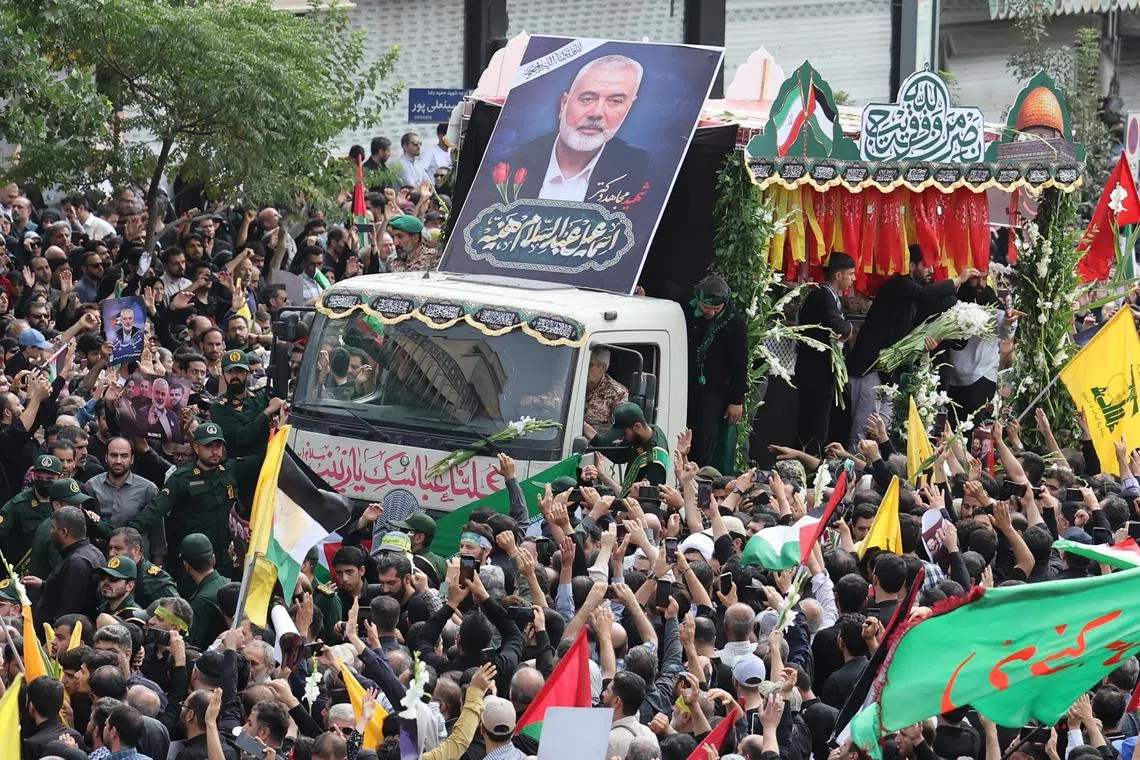News analysis
Anwar’s stance on Haniyeh’s killing shows strong support for Palestine, boosts Islamic credentials
Sign up now: Get insights on the biggest stories in Malaysia

People gather around a truck carrying the coffins of Hamas political leader Ismail Haniyeh and his bodyguard, during a funeral procession in Tehran, Iran, on Aug 1.
PHOTO: EPA-EFE
Follow topic:
KUALA LUMPUR – Since the Israel-Gaza war started last October, Malaysian politicians and some newscasters have regularly donned chequered black-and-white scarves – a symbol of the Palestinian struggle for a homeland – during public appearances.
Thousands of Malaysians have also taken part in several peaceful marches in the country in support of Palestine, and calls are often made in local mosques and online for donations to ease the suffering of people trapped in Gaza.
At some road junctions in Kuala Lumpur, new and tattered Palestinian flags and slogans are hung side by side, by those calling for “Free Palestine” or another public protest.
Thus, it was quite natural for Prime Minister Anwar Ibrahim to lead the country in condemning the assassination of Hamas leader Ismail Haniyeh on July 31.
Hours after the killing in Tehran made global headlines, Datuk Seri Anwar uploaded a video recording of his previous call with the late Hamas leader on social media. The Cabinet and Foreign Ministry also issued written condemnations.
Mr Anwar called the assassination “murder of the most heinous kind” and one
He is slated to attend a huge government-organised Palestinian Liberation Rally in Kuala Lumpur’s main stadium on Aug 4.
Mr Anwar’s stance showed his sincere championing of Palestinian rights, while also boosting his Islamic credentials with the domestic Malay community and wider Muslim world, analysts said.
In contrast, Indonesia offered a relatively low-profile response. President Joko Widodo condemned the killing as “intolerable” in a media doorstop, but with no official statement from him on social media.
Dr Norshahril Saat, a senior fellow at ISEAS – Yusof Ishak Institute, said the political situation in Malaysia and Indonesia determines the respective leadership’s response.
“Every Malaysian prime minister wants to portray himself as the defender of the Malays domestically, a Muslim leader globally. It has been consistent since the premiership of Tun Dr Mahathir Mohamad,” he told The Straits Times.
But while Indonesia is also a strong backer of Palestine, he said, there is some diversity in views over the Gaza war.
“They have several pressure groups such as Nahdlatul Ulama (NU) and Muhammadiyah… Some NU members went to visit key leaders in Israel; that created an uproar. Some say this is a strategic move. Others believe it is wrong.”
An Instagram post in early July showed five members of NU, a 95-million-strong Muslim organisation that is Indonesia’s largest, meeting Israeli President Isaac Herzog over the Gaza war and Indonesia-Israel relationship.
After receiving a public backlash, NU president Yahya Cholil Staquf apologised, while Jakarta distanced the visit from its official position on condemning Israeli violence and providing aid to Palestinians.
On Aug 2, thousands in Jakarta staged prayers for Haniyeh at Istiqlal Mosque, the largest mosque in South-east Asia. And the morning of Aug 3 saw hundreds of protesters gathering outside the American Embassy in Jakarta, but demonstrations were largely peaceful and went on without much incident. Similar prayer sessions are being held in mosques across Malaysia.
Universiti Malaya sociopolitical analyst Awang Azman Awang Pawi said Indonesia has a cautious foreign policy, unlike Malaysia’s stronger stance on the Gaza war.
“Indonesia... tends to adopt a more moderate stance to maintain diplomatic relations with various countries” such as the United States, said Associate Professor Awang Azman.
As for Malaysia, he opined that the outspokenness of Mr Anwar on Palestinian issues is not only about appealing to the Islamic world, but is also aimed at a domestic audience.
The Prime Minister met Haniyeh in Doha, Qatar, on May 24. He defended the engagement with Hamas, a designated terrorist organisation in major Western countries, as a crucial move to secure hostages’ release and a ceasefire.
“Internationally, it enhances Malaysia’s image as a champion of Muslim causes, reinforcing Anwar’s role as a global Islamic leader,” said Prof Awang Azman. “By being vocal about the Palestinian issue, Anwar aligns himself with the broader Muslim electorate in Malaysia.”
The multi-coalition ruling alliance led by Mr Anwar has been struggling to gain Malay support, although he has been prime minister for 20 months.
In the 2023 elections in six of the 13 Malaysian states, opposition alliance Perikatan Nasional (PN) defended the Malay-majority states of Kelantan, Terengganu and Kedah. It made inroads in constituencies in Selangor, Penang and Negeri Sembilan – three states governed by Mr Anwar’s alliance.
His Pakatan Harapan-led alliance suffered another setback in the July 6 by-election in Sungai Bakap, a 60 per cent Malay electorate state seat in Penang, with a lowered vote share of 41.4 per cent against 47.4 per cent in 2023.
PN was seen as having retained strong support among Malay voters, while the Anwar-led alliance lost support among its traditional vote base in the Chinese and Indian communities.
In the upcoming Nenggiri by-election in Kelantan on Aug 17, PM Anwar’s Palestine stance is unlikely to affect voters – 86 per cent of whom are Malays, said independent analyst Adib Zalkapri.
“I don’t think it matters much domestically because all sides of the political divide are supportive of the Palestinian cause,” he said, adding that Malaysia is seen to be more vocal due to Mr Anwar’s keen interest in the issue.


